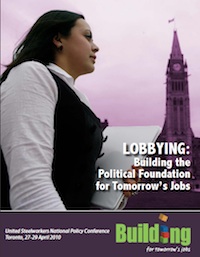For many of us, lobbying is something other people do – women and men who wear fancy clothes and buy politicians lunches at expensive restaurants. But the truth is that lobbying, or trying to influence those who make policies that affect our lives, is something anyone can do.
Lobbying: Bulding the Political Foundation for Tomorrow’s Jobs is a downloadable booklet produced for the 2010 USW National Policy Conference. You can download the pdf here!
Lobbying is a very different form of activism than say, direct action. When lobbying policy makers, activists are working within the political structure to create change. Politeness, promptness, persistence and networking are essential qualities of a good lobbyist. This quick overview will cover:
What is lobbying
Preparation
At the meeting
Trouble shooting
What is lobbying
Lobbying is the act of telling policy makers how to change laws. It involves working with politicans and using public pressure, media attention and personal influence to sway a policy maker to action. Individuals or groups can be lobbyists.
Preparations
Don’t underestimate influential people other than politicians: bureaucrats and city hall staff can have a lot of power in their own right. Don’t be intimidated. In this day and age, everyone’s contact information can be found online. Email and follow up with phone calls. Don’t let them put you on hold. Insist that you can wait to talk to those in power. Use your sway as a constituent, as a voter, to lure politicians into meeting with you. Even though you don’t know a certain minister or mayor now there’s no reason you can’t. With enough determination, even the busiest politician will make time to meet with you.
Boil down key information and important points to a single page that you can leave with whoever you meet with. It’s easier to write longer pieces, but keep the information simple to digest and quick to read. End the one pager with a specific request for action. Rehearse your points and avoid any jargon.
Think very careful about what you expect the politician to actually do. What is a realistic policy that the decision maker can support? How much time will it take to get the policy enacted? The more doable the plan sounds, the more likely a politician is to support it. Consider the role of the politician and make sure what you expect is actually within their power. Do you want them to issue a public statement, influence others behind closed doors or put a policy into effect?
Keep in mind that people are moved by stories. Even if an issue seems removed from a personal perspective, find a story where it impacts someone or a group of people. This can also make it an easier sell if the politician can see how many voters the issue affects, or how many voters also care about it. Also prepare for the personal aspect of the meeting. Read up a bit on the politician, what are their interests and how could those connect to your campaign? Find out their hobbies. If nothing else, leave them with a good impression of you. Tap into their humanity and appeal to it.
At the meeting
The best way to start a meeting is by thanking a politician for their past action on the issue you’re meeting with them about. Even if they did something decades ago, they will be impressed that someone remembers and they might be more likely to pick up that cause or a similar one again. If they used to believe in something strongly, they’ll probably do it again.
Wear clothes that make you seem approachable to the politician so try to match their level of dress. If they wear suites every day, come to the meeting looking business casual. Remember that you’re representing a cause and that people judge based on their own personal point of reference. Some politicians might not take you – and therefore your cause – seriously if you don’t look the part. This also can help to break stereotypes they might hold about activists involved with the cause.
Start with small talk but acknowledge that the politician is busy. Present your cause, personal stories, expectations and one page summary with a specific action the politician can accomplish. Don’t forget the thank yous – both in person and then afterwards through email and phone calls. Keep the pressure on for the politician to follow through. If possible, meeting with them multiple times and developing a friendly relationship can help push your goals forward.
Trouble shooting
If politicians start avoiding you, find a way to track them down directly. Sometimes assistants screening their emails and calls think an official won’t be interested when you can convince them otherwise. Hang around their office at lunch time. Approach them at speaking events or rallies.
If you don’t have time to research a politician, glance around their office for conversation starters. Maybe their diploma is from a school known for activist groups or experts who speak out on your issue. Sometimes benign office knickknacks can offer real insight into a person.
Keep on good terms with the people who facilitate your meeting with politicians. Chat up staff and become known as a person that they appreciate having around, rather than an annoyance. Bringing coffees, being polite or conversational are all easy ways to ensure you keep in contact with the decision makers.
Media attention can also move a campaign forward. Get people talking about the issues that your lobbying for to create public pressure for policy makers to respond.



